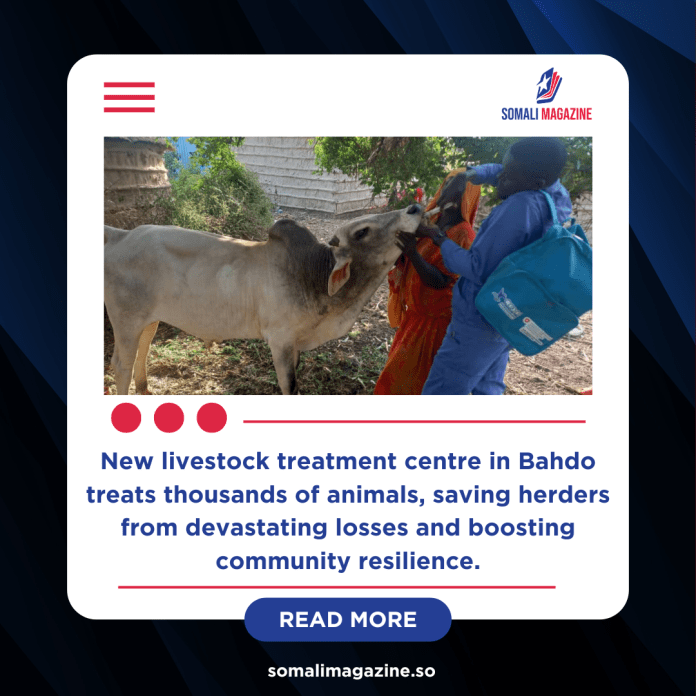Facebook Twitter (X) Instagram Somali Magazine - People's Magazine
A new veterinary treatment centre opened by the Galmudug state government in Bahdo, central Somalia, is bringing relief to pastoralist families struggling to keep their animals healthy.
Since the centre began operating on June 1, 2025, around 500 families have brought nearly 2,000 animals—mostly camels and goats—for free treatment and vaccinations. The facility is located in Galgadud region and is run by a team of five veterinarians led by Dr. Jama Ali Mohamed from the Ministry of Livestock.
Dr. Jama explained that the centre aims to protect livestock from deadly and damaging diseases that reduce their productivity and threaten the income of pastoralist families. Treatment is given at no cost, helping many herders who often cannot afford veterinary care, especially during hard times.
“When our animals are sick, we can’t make a living. This centre has really helped us. All animals brought in are treated, and we even vaccinate them against major diseases. We have experts for goats, camels, cows, and sheep,” said Dr. Jama in an interview with Radio Ergo.
Common diseases seen in the area include pneumonia, measles, and tick-borne infections. These diseases have caused major losses in recent months, especially as many herders moved their animals in search of pasture and water, which increased the risk of disease spread.
Mahmud Osman Abdi, a livestock herder in Bahdo, lost 47 goats in May due to pneumonia. He couldn’t afford treatment at the time. Two weeks ago, he brought his remaining 82 goats to the new centre. They were treated for free and are now recovering.
“My goats had symptoms like hair loss and weakness. Some were just lying down and dying. Now, they’re healthy and eating again,” said Mahmud.
This is the first time in his 18 years as a herder that he has received free animal treatment. His family, including 11 children, had been struggling due to a lack of milk and income from the sick animals. They were surviving on one meal a day thanks to help from relatives.
Mahmud used to rely on traditional medicine, using herbs and plants to treat his animals. Sometimes it worked, but many animals died. With no money and no market value for sick animals, he would occasionally slaughter one and feed his family for a few days. Now, he sees the new centre as a lifeline and plans to bring in any sick animal as soon as symptoms appear.
Another herder, Abdi Ali Dirshe, had 170 goats treated in June for pneumonia, foot-and-mouth disease, and ticks. His animals are his only source of income for his family of 12. When the animals got sick in April and May, he lost 22 goats. During this period, he had to buy food on credit, now owing $160, which he hopes to repay once his animals recover and can be sold.
Abdi believes the diseases were spread by nomads moving through the area with sick herds. “We saw animals looking very weak, and then they just died. But now, after treatment, the goats are strong and moving again,” he said.
Dr. Jama and his team are also educating the community about animal health and plan to expand their work. They hope to form mobile vet teams that can reach more remote areas and monitor livestock regularly.
“Right now, people bring animals to our centre. But before, we used to travel to remote areas with help from NGOs. We’ve only been here a month, and already we’ve seen big improvements,” Dr. Jama said.
The new veterinary centre is proving to be a vital service for the people of Bahdo and surrounding areas, offering real hope to herding families who depend on livestock for survival.

